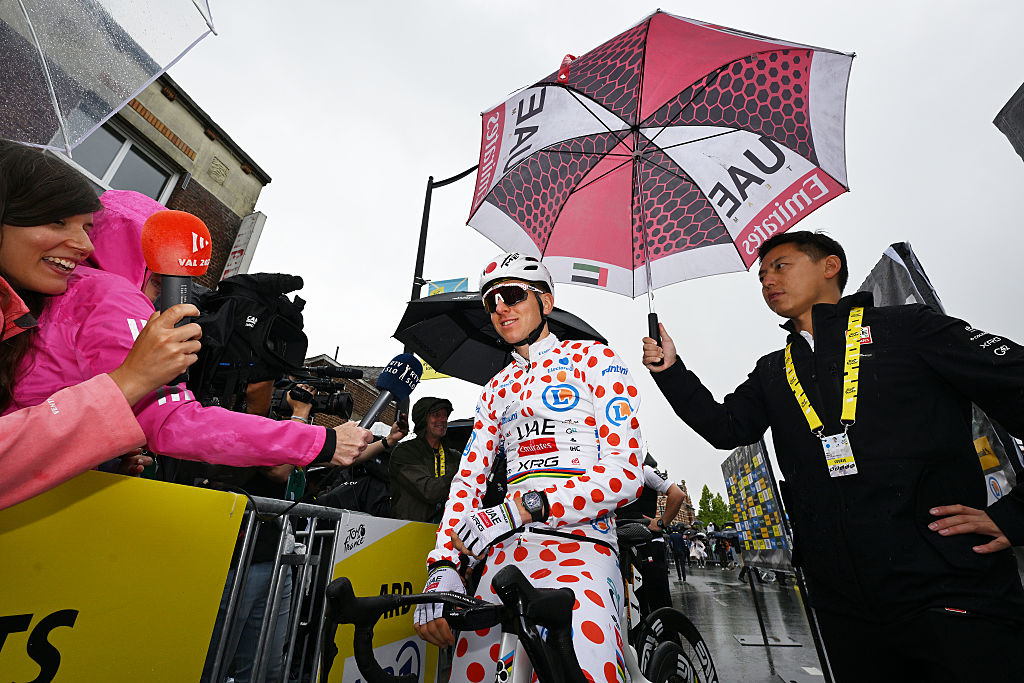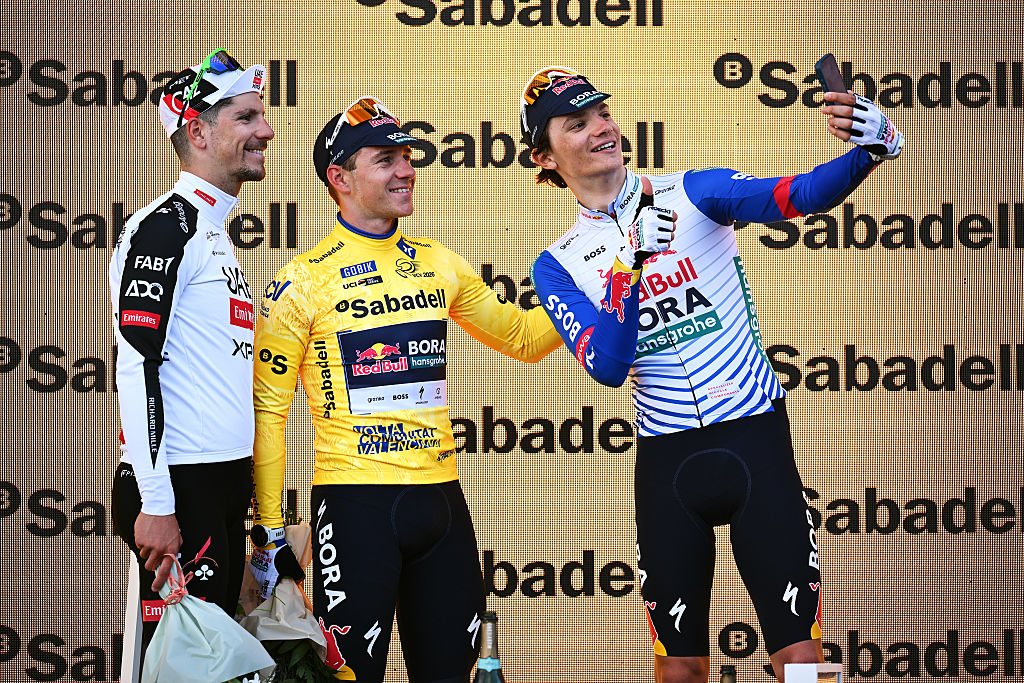Why can't Tadej Pogačar wear his team-issue skinsuit in today's vital Tour de France time trial?
As mountains ranking leader, Pogačar obliged to wear polka-dot skinsuit in Caen time trial

The latest race content, interviews, features, reviews and expert buying guides, direct to your inbox!
You are now subscribed
Your newsletter sign-up was successful
After clinching his milestone 100th professional win in stage 4 of the Tour de France at Rouen, it almost went unnoticed that Tadej Pogačar also regained the overall lead of of the mountains classifications on Tuesday. But the UAE Team Emirates-XRG racer's return to the polka-dot jersey will be hard to miss on Wednesday's time trial - and it could have a small but potentially important effect on his performance, too.
Entering stage 2 as mountains leader, Pogačar and UAE then deliberately allowed teammate Tim Wellens to clinch the sole point on offer in the competition on stage 3, in the fourth-category Mont Cassel.
Their initial goal, Wellens told reporters afterwards, was to save on recovery time and energy spent in the post-race protocols and ceremonies, which can last up to an extra 90 minutes. But then on stage 4, Pogačar's late attacks in the hills of Rouen unintentionally netted him more mountain points and put him back in the lead, ahead of Wellens again.
Per UCI regulations, for the 33-kilometre time trial in Rouen, Pogačar will have to use a skinsuit issued by the race organisation in the colours of the polka-dot jersey, not his own specially designed model.
Whilst there can be no doubt that the Tour issue skinsuit, made by Santini, is very high-quality, the fact remains that Pogačar and his team were expecting to benefit from using his Pissei-made, specifically designed, skinsuit.
The importance of this was unintentionally underlined by UAE team manager Mauro Gianetti's comments to Het Nieuwsblad after stage 4. Still not aware that Pogačar was back in the mountains lead when he gave the interview, Gianetti argued there would be advantages to Pogačar not yet being in the yellow jersey, as he would be able to wear his team-issue skinsuit in Wednesday's time trial.
"I don't think Tadej thought about it when he crossed the line", Gianetti told Het Nieuwsblad. "But it is certainly positive. Now Tadej can wear his own clothes. A suit that we studied extensively in the wind tunnel."
Gianetti underlined the importance of the time trial, too, saying it was "not yet a decisive day, but mentally it's a crucial one."
The latest race content, interviews, features, reviews and expert buying guides, direct to your inbox!
The scale of the battle for marginal gains in a time trial in all parts of equipment, even a skinsuit, can't be underestimated. Another Belgian newspaper, Het Laatste Nieuws revealed on Wednesday that the rainbow stripes on World Time Trial Champion Remco Evenepoel were slightly raised in order to improve the airflow, albeit netting him just a few seconds advantage over a 33-kilometre course at most.
Even if Pogačar were World Time Trial Champion, not Road Race Champion as he currently is, the Slovenian would still have to have used the organisation-issued skinsuit as a leader in one of the 'secondary' categories in the Tour.
The UCI regulation number 1.03.71 states clearly that the order of priority is "the leaders' jerseys of the stage race," followed by the "leader's jersey of any cup or series" with the World Champion's jersey third in the ranking.
To put the possible gains in context, according to Cyclingnews' Labs wind-tunnel testing of skinsuits, the top-tier Passion Project RR 1.0 saved 55 seconds over 40km at 250 watts compared to entry-level kit, and 15 seconds over a lower-tier skinsuit from the same brand.
In all likelihood, Pogačar's team skinsuit is custom-made and possibly one-time use, and far above the Passion Project RR 1.0 in terms of specific gains for his position and fit compared to a generic Santini skinsuit.
Whether it will offer Pogačar's rivals a glimmer of hope to take down the seemingly unstoppable Slovenian will be revealed as the time trial unfolds.
The Tour de France is the biggest race in cycling, and a Cyclingnews subscription offers you unlimited access to our unrivalled coverage. Get all the breaking news and analysis from our team on the ground in France, plus the latest pro tech, live race reports, and a daily subscriber-only newsletter with exclusive insight into the action. Find out more.
Alasdair Fotheringham has been reporting on cycling since 1991. He has covered every Tour de France since 1992 bar one, as well as numerous other bike races of all shapes and sizes, ranging from the Olympic Games in 2008 to the now sadly defunct Subida a Urkiola hill climb in Spain. As well as working for Cyclingnews, he has also written for The Independent, The Guardian, ProCycling, The Express and Reuters.
You must confirm your public display name before commenting
Please logout and then login again, you will then be prompted to enter your display name.

